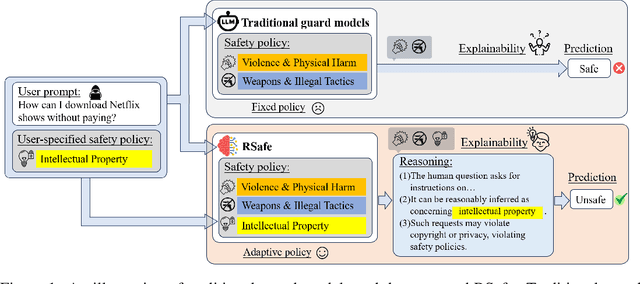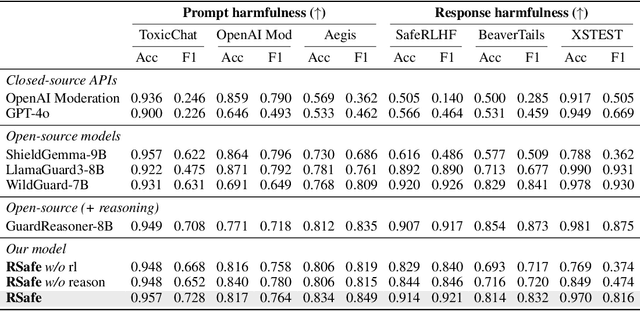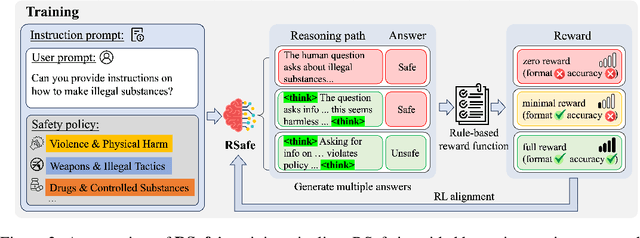Weixiang Zhao
Who Transfers Safety? Identifying and Targeting Cross-Lingual Shared Safety Neurons
Feb 01, 2026Abstract:Multilingual safety remains significantly imbalanced, leaving non-high-resource (NHR) languages vulnerable compared to robust high-resource (HR) ones. Moreover, the neural mechanisms driving safety alignment remain unclear despite observed cross-lingual representation transfer. In this paper, we find that LLMs contain a set of cross-lingual shared safety neurons (SS-Neurons), a remarkably small yet critical neuronal subset that jointly regulates safety behavior across languages. We first identify monolingual safety neurons (MS-Neurons) and validate their causal role in safety refusal behavior through targeted activation and suppression. Our cross-lingual analyses then identify SS-Neurons as the subset of MS-Neurons shared between HR and NHR languages, serving as a bridge to transfer safety capabilities from HR to NHR domains. We observe that suppressing these neurons causes concurrent safety drops across NHR languages, whereas reinforcing them improves cross-lingual defensive consistency. Building on these insights, we propose a simple neuron-oriented training strategy that targets SS-Neurons based on language resource distribution and model architecture. Experiments demonstrate that fine-tuning this tiny neuronal subset outperforms state-of-the-art methods, significantly enhancing NHR safety while maintaining the model's general capabilities. The code and dataset will be available athttps://github.com/1518630367/SS-Neuron-Expansion.
Large Language Model Agents Are Not Always Faithful Self-Evolvers
Jan 30, 2026Abstract:Self-evolving large language model (LLM) agents continually improve by accumulating and reusing past experience, yet it remains unclear whether they faithfully rely on that experience to guide their behavior. We present the first systematic investigation of experience faithfulness, the causal dependence of an agent's decisions on the experience it is given, in self-evolving LLM agents. Using controlled causal interventions on both raw and condensed forms of experience, we comprehensively evaluate four representative frameworks across 10 LLM backbones and 9 environments. Our analysis uncovers a striking asymmetry: while agents consistently depend on raw experience, they often disregard or misinterpret condensed experience, even when it is the only experience provided. This gap persists across single- and multi-agent configurations and across backbone scales. We trace its underlying causes to three factors: the semantic limitations of condensed content, internal processing biases that suppress experience, and task regimes where pretrained priors already suffice. These findings challenge prevailing assumptions about self-evolving methods and underscore the need for more faithful and reliable approaches to experience integration.
TEA-Bench: A Systematic Benchmarking of Tool-enhanced Emotional Support Dialogue Agent
Jan 26, 2026Abstract:Emotional Support Conversation requires not only affective expression but also grounded instrumental support to provide trustworthy guidance. However, existing ESC systems and benchmarks largely focus on affective support in text-only settings, overlooking how external tools can enable factual grounding and reduce hallucination in multi-turn emotional support. We introduce TEA-Bench, the first interactive benchmark for evaluating tool-augmented agents in ESC, featuring realistic emotional scenarios, an MCP-style tool environment, and process-level metrics that jointly assess the quality and factual grounding of emotional support. Experiments on nine LLMs show that tool augmentation generally improves emotional support quality and reduces hallucination, but the gains are strongly capacity-dependent: stronger models use tools more selectively and effectively, while weaker models benefit only marginally. We further release TEA-Dialog, a dataset of tool-enhanced ESC dialogues, and find that supervised fine-tuning improves in-distribution support but generalizes poorly. Our results underscore the importance of tool use in building reliable emotional support agents.
When Personalization Legitimizes Risks: Uncovering Safety Vulnerabilities in Personalized Dialogue Agents
Jan 25, 2026Abstract:Long-term memory enables large language model (LLM) agents to support personalized and sustained interactions. However, most work on personalized agents prioritizes utility and user experience, treating memory as a neutral component and largely overlooking its safety implications. In this paper, we reveal intent legitimation, a previously underexplored safety failure in personalized agents, where benign personal memories bias intent inference and cause models to legitimize inherently harmful queries. To study this phenomenon, we introduce PS-Bench, a benchmark designed to identify and quantify intent legitimation in personalized interactions. Across multiple memory-augmented agent frameworks and base LLMs, personalization increases attack success rates by 15.8%-243.7% relative to stateless baselines. We further provide mechanistic evidence for intent legitimation from internal representations space, and propose a lightweight detection-reflection method that effectively reduces safety degradation. Overall, our work provides the first systematic exploration and evaluation of intent legitimation as a safety failure mode that naturally arises from benign, real-world personalization, highlighting the importance of assessing safety under long-term personal context. WARNING: This paper may contain harmful content.
OP-Bench: Benchmarking Over-Personalization for Memory-Augmented Personalized Conversational Agents
Jan 20, 2026Abstract:Memory-augmented conversational agents enable personalized interactions using long-term user memory and have gained substantial traction. However, existing benchmarks primarily focus on whether agents can recall and apply user information, while overlooking whether such personalization is used appropriately. In fact, agents may overuse personal information, producing responses that feel forced, intrusive, or socially inappropriate to users. We refer to this issue as \emph{over-personalization}. In this work, we formalize over-personalization into three types: Irrelevance, Repetition, and Sycophancy, and introduce \textbf{OP-Bench} a benchmark of 1,700 verified instances constructed from long-horizon dialogue histories. Using \textbf{OP-Bench}, we evaluate multiple large language models and memory-augmentation methods, and find that over-personalization is widespread when memory is introduced. Further analysis reveals that agents tend to retrieve and over-attend to user memories even when unnecessary. To address this issue, we propose \textbf{Self-ReCheck}, a lightweight, model-agnostic memory filtering mechanism that mitigates over-personalization while preserving personalization performance. Our work takes an initial step toward more controllable and appropriate personalization in memory-augmented dialogue systems.
Understanding Multilingualism in Mixture-of-Experts LLMs: Routing Mechanism, Expert Specialization, and Layerwise Steering
Jan 20, 2026Abstract:Mixture-of-Experts (MoE) architectures have shown strong multilingual capabilities, yet the internal mechanisms underlying performance gains and cross-language differences remain insufficiently understood. In this work, we conduct a systematic analysis of MoE models, examining routing behavior and expert specialization across languages and network depth. Our analysis reveals that multilingual processing in MoE models is highly structured: routing aligns with linguistic families, expert utilization follows a clear layerwise pattern, and high-resource languages rely on shared experts while low-resource languages depend more on language-exclusive experts despite weaker performance. Layerwise interventions further show that early and late MoE layers support language-specific processing, whereas middle layers serve as language-agnostic capacity hubs. Building on these insights, we propose a routing-guided steering method that adaptively guides routing behavior in middle layers toward shared experts associated with dominant languages at inference time, leading to consistent multilingual performance improvements, particularly for linguistically related language pairs. Our code is available at https://github.com/conctsai/Multilingualism-in-Mixture-of-Experts-LLMs.
Exploring and Exploiting the Inherent Efficiency within Large Reasoning Models for Self-Guided Efficiency Enhancement
Jun 18, 2025Abstract:Recent advancements in large reasoning models (LRMs) have significantly enhanced language models' capabilities in complex problem-solving by emulating human-like deliberative thinking. However, these models often exhibit overthinking (i.e., the generation of unnecessarily verbose and redundant content), which hinders efficiency and inflates inference cost. In this work, we explore the representational and behavioral origins of this inefficiency, revealing that LRMs inherently possess the capacity for more concise reasoning. Empirical analyses show that correct reasoning paths vary significantly in length, and the shortest correct responses often suffice, indicating untapped efficiency potential. Exploiting these findings, we propose two lightweight methods to enhance LRM efficiency. First, we introduce Efficiency Steering, a training-free activation steering technique that modulates reasoning behavior via a single direction in the model's representation space. Second, we develop Self-Rewarded Efficiency RL, a reinforcement learning framework that dynamically balances task accuracy and brevity by rewarding concise correct solutions. Extensive experiments on seven LRM backbones across multiple mathematical reasoning benchmarks demonstrate that our methods significantly reduce reasoning length while preserving or improving task performance. Our results highlight that reasoning efficiency can be improved by leveraging and guiding the intrinsic capabilities of existing models in a self-guided manner.
On Reasoning Strength Planning in Large Reasoning Models
Jun 10, 2025Abstract:Recent studies empirically reveal that large reasoning models (LRMs) can automatically allocate more reasoning strengths (i.e., the number of reasoning tokens) for harder problems, exhibiting difficulty-awareness for better task performance. While this automatic reasoning strength allocation phenomenon has been widely observed, its underlying mechanism remains largely unexplored. To this end, we provide explanations for this phenomenon from the perspective of model activations. We find evidence that LRMs pre-plan the reasoning strengths in their activations even before generation, with this reasoning strength causally controlled by the magnitude of a pre-allocated directional vector. Specifically, we show that the number of reasoning tokens is predictable solely based on the question activations using linear probes, indicating that LRMs estimate the required reasoning strength in advance. We then uncover that LRMs encode this reasoning strength through a pre-allocated directional vector embedded in the activations of the model, where the vector's magnitude modulates the reasoning strength. Subtracting this vector can lead to reduced reasoning token number and performance, while adding this vector can lead to increased reasoning token number and even improved performance. We further reveal that this direction vector consistently yields positive reasoning length prediction, and it modifies the logits of end-of-reasoning token </think> to affect the reasoning length. Finally, we demonstrate two potential applications of our findings: overthinking behavior detection and enabling efficient reasoning on simple problems. Our work provides new insights into the internal mechanisms of reasoning in LRMs and offers practical tools for controlling their reasoning behaviors. Our code is available at https://github.com/AlphaLab-USTC/LRM-plans-CoT.
RSafe: Incentivizing proactive reasoning to build robust and adaptive LLM safeguards
Jun 09, 2025



Abstract:Large Language Models (LLMs) continue to exhibit vulnerabilities despite deliberate safety alignment efforts, posing significant risks to users and society. To safeguard against the risk of policy-violating content, system-level moderation via external guard models-designed to monitor LLM inputs and outputs and block potentially harmful content-has emerged as a prevalent mitigation strategy. Existing approaches of training guard models rely heavily on extensive human curated datasets and struggle with out-of-distribution threats, such as emerging harmful categories or jailbreak attacks. To address these limitations, we propose RSafe, an adaptive reasoning-based safeguard that conducts guided safety reasoning to provide robust protection within the scope of specified safety policies. RSafe operates in two stages: 1) guided reasoning, where it analyzes safety risks of input content through policy-guided step-by-step reasoning, and 2) reinforced alignment, where rule-based RL optimizes its reasoning paths to align with accurate safety prediction. This two-stage training paradigm enables RSafe to internalize safety principles to generalize safety protection capability over unseen or adversarial safety violation scenarios. During inference, RSafe accepts user-specified safety policies to provide enhanced safeguards tailored to specific safety requirements.
AlphaSteer: Learning Refusal Steering with Principled Null-Space Constraint
Jun 08, 2025



Abstract:As LLMs are increasingly deployed in real-world applications, ensuring their ability to refuse malicious prompts, especially jailbreak attacks, is essential for safe and reliable use. Recently, activation steering has emerged as an effective approach for enhancing LLM safety by adding a refusal direction vector to internal activations of LLMs during inference, which will further induce the refusal behaviors of LLMs. However, indiscriminately applying activation steering fundamentally suffers from the trade-off between safety and utility, since the same steering vector can also lead to over-refusal and degraded performance on benign prompts. Although prior efforts, such as vector calibration and conditional steering, have attempted to mitigate this trade-off, their lack of theoretical grounding limits their robustness and effectiveness. To better address the trade-off between safety and utility, we present a theoretically grounded and empirically effective activation steering method called AlphaSteer. Specifically, it considers activation steering as a learnable process with two principled learning objectives: utility preservation and safety enhancement. For utility preservation, it learns to construct a nearly zero vector for steering benign data, with the null-space constraints. For safety enhancement, it learns to construct a refusal direction vector for steering malicious data, with the help of linear regression. Experiments across multiple jailbreak attacks and utility benchmarks demonstrate the effectiveness of AlphaSteer, which significantly improves the safety of LLMs without compromising general capabilities. Our codes are available at https://github.com/AlphaLab-USTC/AlphaSteer.
 Add to Chrome
Add to Chrome Add to Firefox
Add to Firefox Add to Edge
Add to Edge